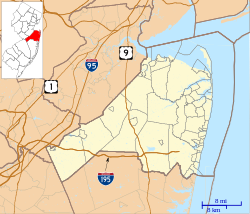Water Witch Club Casino | |
 | |
| Location | East Twin Road and West Twin Road, Middletown Township, New Jersey |
|---|---|
| Coordinates | 40°24′01″N73°59′36″W / 40.40028°N 73.99333°W |
| Built | 1905 |
| Architect | Lyman T. Ford |
| Architectural style | Colonial Revival, American Craftsman, Shingle Style |
| Part of | Water Witch Club Historic District (ID04000147) |
| NRHP reference No. | 90001219 [1] |
| NJRHP No. | 2035 [2] |
| Significant dates | |
| Added to NRHP | August 13, 1990 |
| Designated CP | March 12, 2004 |
| Designated NJRHP | January 12, 1990 |
The Water Witch Club Casino is located at the corner of East Twin Road and West Twin Road in the Monmouth Hills section of Middletown Township in Monmouth County, New Jersey, United States. It is near the Waterwitch section of the borough of Highlands. The building was added to the National Register of Historic Places on August 13, 1990, for its significance in architecture and entertainment. [1] [3] It was listed as a contributing property of the Water Witch Club Historic District in 2004. [4]





